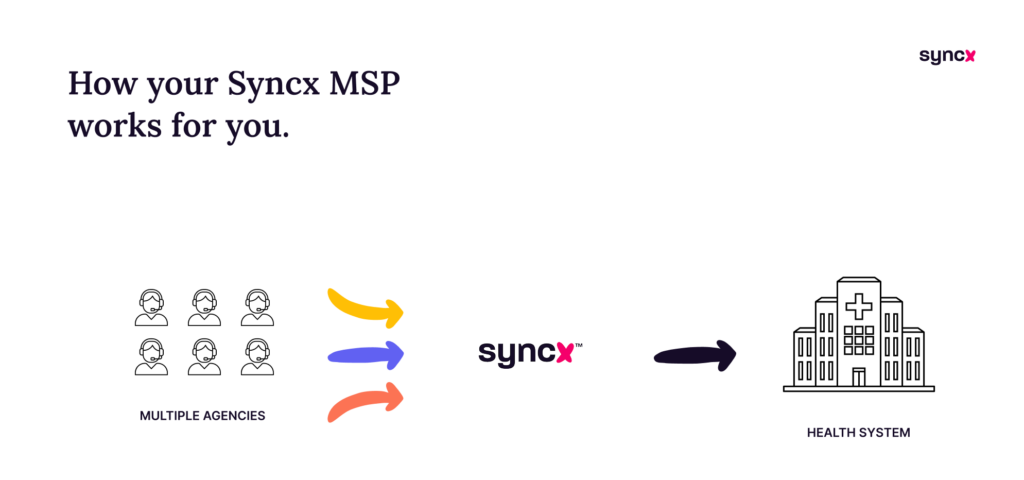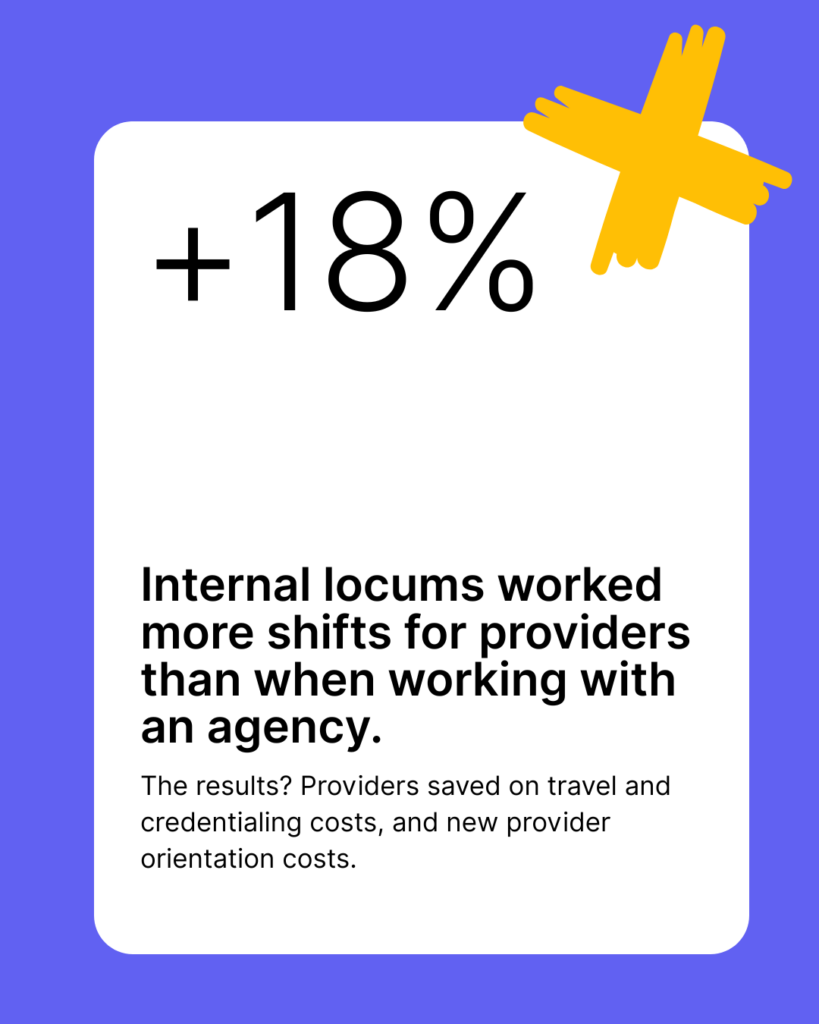Healthcare organizations today face unprecedented staffing challenges including rising demand, clinician burnout, and the constant pressure to balance quality care with cost efficiency. For facilities relying on locum tenens and temporary staff, these challenges are even more acute. A strategic Managed Services Provider (MSP) partner can be the difference between scrambling to fill last-minute gaps and operating with a seamless, optimized workforce.
But not all MSPs are created equal. The right partner becomes an extension of your team, ensuring compliance, reducing costs, and improving continuity of care. From navigating complex credentialing to deploying locum tenens at scale, healthcare demands an MSP with deep industry expertise and a proactive approach.
In this guide, we’ll explore what to look for in a healthcare staffing MSP, the must-have services they should provide, and how the right partnership can transform your flexible workforce strategy. Whether you’re managing locum physicians or advanced practice providers, the insights ahead will help you make an informed choice that supports your clinicians, your patients, and your bottom line.
What Is a MSP Partner?
A Managed Services Provider (MSP) Partner in healthcare staffing is a third-party firm that manages the contingent workforce (temporary or locum tenens staff) for healthcare organizations. MSPs streamline hiring, compliance, and vendor management, acting as an intermediary between healthcare facilities (hospitals, clinics, etc.) and staffing agencies.
Types of Healthcare Staffing MSPs:
- Locum Tenens MSPs: Focus exclusively on temporary physicians and healthcare providers.
- Clinical Staffing MSPs: Cover nurses, therapists, and allied health professionals.
- Total Workforce MSPs: Manage both permanent and contingent staffing needs.

What Does an MSP Partner Do?
A healthcare staffing MSP partner takes over the complexities of hiring and managing temporary staff, allowing facilities to focus on patient care. Core responsibilities include:
- Overseeing relationships with multiple staffing agencies to ensure competitive rates and quality candidates. Partnering with niche agencies specializing in hard-to-fill specialties (e.g., Gastroenterology).
- Using technology (VMS platforms) to match facilities with pre-vetted staff. Expediting hiring for urgent needs (e.g., last-minute surgeon coverage).
- Verifying licenses, certifications, and facilitating privileges.
- Negotiating rates, managing work records, and handling invoicing for temporary staff.
- Tracking fill rates, time-to-hire, and clinician performance. Providing data analytics to optimize future staffing decisions.
Why Does Healthcare Need Unique MSP Support?
Healthcare staffing operates under high-stakes conditions where delays or missteps can directly impact patient care. Unlike other industries, healthcare requires MSP partners who understand clinical workflows, regulatory demands, and the urgency of filling critical roles, especially in locum tenens, where a single vacancy can disrupt entire departments.
Traditional staffing MSPs often lack the niche expertise needed to navigate healthcare’s complexities, from validating a surgeon’s board certifications to ensuring a traveling nurse meets interstate licensing requirements. A healthcare-specific MSP deals with compliance, scalability, and workforce readiness in ways that generic providers can’t address.
Compliance & Security: From Credentialing to Privileging
Healthcare staffing MSPs must uphold rigorous standards to protect both facilities and temporary staff. Credentialing is a cornerstone. Locum tenens providers, for example, often work in multiple states, and at multiple facilities, requiring MSPs to verify licenses and DEA registrations for each assignment. Once credentialing is complete, MSPs also help ensure a smooth privileging process, making sure that the vital authorization temporary providers need in order to practice doesn’t fall through the cracks.
Scalability & Flexibility
Healthcare staffing needs fluctuate dramatically—seasonal demand, sudden resignations, or bridging gaps between permanent provider start dates require MSPs to scale up or down rapidly. For locum tenens, this means maintaining a deep bench of pre-vetted providers who can deploy within days, not weeks. A strong MSP partner leverages technology (like AI-driven talent matching) and a broad network of agencies to fill gaps without compromising quality.
Flexibility is also important: MSPs must accommodate unique terms for locums, such as shift length adjustments, housing arrangements, or last-minute extensions, while keeping costs predictable for facilities.
End-User Support for Healthcare Staff
End-user support is equally critical; MSPs must offer help desks to resolve software or administrative issues quickly. By reducing the learning curve and promptly addressing any issues that arise, MSPs ensure temporary staff deliver consistent, high-quality care from day one.
What Services Should a Healthcare MSP Partner Offer?
A top-tier healthcare staffing MSP should provide end-to-end solutions tailored to the fast-paced, compliance-driven nature of the industry. Key services include:
- Agency Management – Overseeing relationships with staffing agencies to ensure competitive pricing, quality candidates, and streamlined contracting.
- Talent Acquisition & Placement – Rapidly sourcing and matching pre-vetted locum tenens physicians, nurses, and allied health professionals to open roles.
- Credentialing – Verifying licenses and documentation showing that a provider is eligible to practice.
- Contract & Invoice Administration – Handling timesheets, invoicing, and travel reimbursements for locums.
- Support & Issue Resolution – Offering dedicated help desks for agencies and facilities to address software, scheduling, or administrative challenges.
- Workforce Analytics & Reporting – Tracking fill rates, time-to-hire, satisfaction rates, locums retention rates, and spend to optimize future staffing strategies.
- Contingency Planning – Ensuring backup staffing solutions for emergencies, such as sudden surges in demand or unexpected clinician absences.
For locum tenens MSPs, speed and compliance are non-negotiable—look for partners with specialized expertise in rapid placements and interstate licensing.
What Are the Qualities of a Strong Healthcare MSP Partner?
A high-performing healthcare staffing MSP is a strategic ally in optimizing workforce efficiency, cost control, and care quality. The best partners combine deep industry expertise with agile, tech-enabled solutions to address the unique pressures of healthcare staffing, particularly in the fast-moving locum tenens space.
Reducing Your Locums Spend & Utilization
An effective MSP helps facilities minimize unnecessary locum tenens usage while ensuring coverage where it’s truly needed. This involves analyzing historical staffing patterns to identify over-reliance on locums, negotiating better rates through consolidated vendor partnerships, and implementing predictive analytics to anticipate future gaps.
For example, an MSP might uncover that a hospital’s frequent use of locum hospitalists stems from chronic scheduling inefficiencies rather than true demand, allowing for permanent hires or internal adjustments that lower long-term costs.
Decreased Wait Times
In healthcare staffing, delays directly impact patient access. A strong MSP partner accelerates time-to-fill for locum tenens and other temporary roles by maintaining a curated network of credentialed providers ready for rapid deployment.
Advanced MSPs leverage AI-driven matching and rate guidance to cut placement times from weeks to days—critical for specialties like emergency medicine or critical care, where vacancies can force department closures. Real-time visibility into candidate availability and streamlined approval workflows further prevent bottlenecks.

Improved Continuity of Care
Frequent turnover among temporary staff can disrupt care teams and erode patient trust. Top MSPs mitigate this by prioritizing clinician consistency (e.g., rebooking the same providers for repeat assignments) and thorough onboarding that aligns temps with facility workflows.
Some MSPs also offer “float pool” solutions, where a rotating group of trusted locums familiar with the organization fills gaps, reducing the learning curve. By stabilizing staffing fluctuations, MSPs help maintain care quality, reduce medical errors, and preserve team morale.
Contract Terms & SLAs: What to Watch Out For
When partnering with a healthcare staffing MSP, look for agency and client NPS scores. Happy agencies mean more engaged agencies. Ratings of the technology used is also an important indicator as not all tech is created equal. Understand neutral vs. agency owned programs so you can make a more informed decision on the model that will work best for your organization.
Finally, do your research to understand how your program works and who will fund it. If your agencies are nickled and dimed as part of their contract, you likely will be too.
Regain Control Over Your Flexible Workforce with Syncx
Navigating healthcare staffing’s complexities requires a partner who understands the urgency of locum tenens placements, the rigor of compliance, and the need for cost efficiency—without sacrificing care quality. Syncx’s healthcare-focused MSP solutions combine deep industry expertise with cutting-edge technology to reduce spend and ensure seamless coverage.
Ready to transform your staffing strategy? Book a demo today and see how Syncx can put you back in control.
